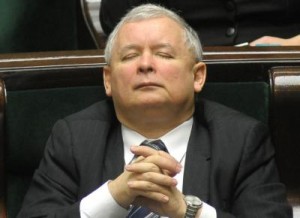
Bringing bad news for Brussels, the block of Euro skeptics stretches now from Warsaw to Budapest. For the first time since the fall of the Berlin Wall in 1989, a conservative right wing party has won the elections in Poland. On Oct. 25, the Right and Justice party (or PiS) obtained 232 seats out of 460 and wiped out the Left with the liberal Civic Platform party (or PO) taking second place. Donald Tusk, the former prime minister of Poland from 2007 and founder of the Civic Platform party, became president of the European Council on Dec. 1, 2014, and is therefore far away in Brussels.

Yaroslaw Kaczynski, president of the PiS, is today the strong man of Poland’s politics and overshadows even the president Andrej Duda. Since he is now pulling the strings, Kaczynski will favor the appointment of his protégé senator Beata Szydlo as prime minister to replace the current prime minister Ewa Kopacz, another woman who belongs to the the PO party.
Former Polish president Lech Kaczynski – Yaroslaw’s twin – died in a plane crash in 2010 with his wife and a high level delegation of government officials. To this day, many Poles still suspect an assassination and wonder why the plane has never been repatriated from Russia.
Economically, Poland can be considered as a success story. As the sixth largest country of the EU, unemployment is only 7.5 versus 9 percent for the rest of Europe. But these figures are somewhat misleading. For instance, out of the 115 billion Euro profit generated by foreign companies, only 75 percent came back to Poland and 63 percent of the banking sector is run by foreigners. Moreover, the spectacular 4 percent growth of the Gross Domestic Product since 2004 is beginning to slow down.
Remnants of the “old economy” still exist, such as the reliance on coal as the main source of energy. The future prime minister Beata Szydlo was born in the south of Poland near Oswiecim (Auschwitz) from a family of miners. It is likely that she will not close the coal mines as advocated by the PO opposition party. The economic program of Poland is a sort of a cocktail between the French right wing of Marine Le Pen and the French Parti de gauche headed by Jean-Luc Melanchon.
Regarding the problem of refugees, Poland is aligned with the position of the Czech Republic, Slovakia, Bulgaria and Hungary and also the UK. It is reluctant to accept the recent directives from Brussels to relocate 160,000 people between the 29 members of the EU. In the same way as the UK, Poland is concerned with security and also, being a catholic country, it has somewhat of a fear of Islam. It tends to reject any decision, which it considers a breach of its sovereignty.
The shift to a more conservative and nationalistic government in Poland therefore may increase the fragility of the European Union. Right now it contributes to a growing divide between western and eastern Europe, though Poland cannot afford to be too hostile to a federal Europe since it still needs its financial support.

About the author: Nicole Prévost Logan divides her time between Essex and Paris, spending summers in the former and winters in the latter. She writes a regular column for us from her Paris home where her topics will include politics, economy, social unrest — mostly in France — but also in other European countries. She also covers a variety of art exhibits and the performing arts in Europe. Logan is the author of ‘Forever on the Road: A Franco-American Family’s Thirty Years in the Foreign Service,’ an autobiography of her life as the wife of an overseas diplomat, who lived in 10 foreign countries on three continents. Her experiences during her foreign service life included being in Lebanon when civil war erupted, excavating a medieval city in Moscow and spending a week under house arrest in Guinea.